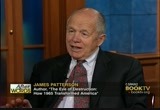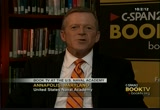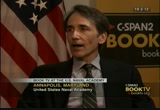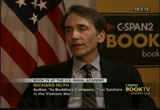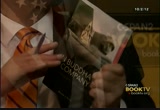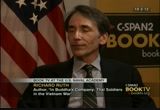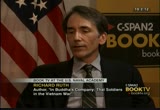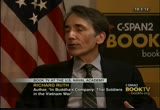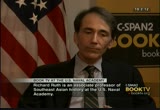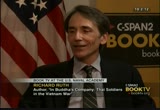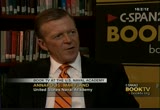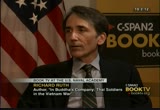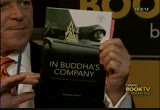tv Book TV CSPAN November 25, 2012 1:00pm-1:15pm EST
1:00 pm
1:01 pm
1:02 pm
>> that was "war words" in which authors of the latest nonfiction books are interviewed by journalists, public policymakers, legislators and others familiar with their material. "after words" airs at 10:00 p.m. on saturday, 12 and 9:00 p.m. on sunday, and. >> richard ruth was interviewed about his book "in buddha's company" at the u.s. naval academy. this is part of book tv's college series and it's a little under 15 minutes. >> host: book tvs on location at the u.s. naval academy in a
1:03 pm
aanapolis. professor ruth, what do you teach? >> guest: i teach southeast asian history. i concentrate on tie lan and vietnam. >> host: why is it important for students to know southeast asian history. >> guest: united states is still very much engaged in that corner of the worldment we have many alis and partners we're working with, and many students, midshipman, are going to be officers who are going to go to southeast asia and represent our interests there. so i think it's important for them to know southeast asian history to be comfortable with the culture and have some knowledge of their history. >> host: well, professor ruth. one of our long-time allies is thigh taken, and you have written a book called "in buddha's company: thai sole soldiers in the vietnam war." what role did they play?
1:04 pm
>> guest: thailand was a close ally of the united states during the vietnam war. many people who are official with the circumstance good-familiar with the circumstances of she vietnam, but not only thailand sent troops but also served as a base for many of the aircraft that were flying, bombing missions over laos and south vietnam. at the time we had built seven air bases and developed a port there as well to facilitate the u.s. effort in the vietnam war and also many american soldiers went on r & r to bangkok and spent a lot of time there. so in terms of direct support and peripheral support, thailand was a close ally of the u.s. and an important part of the war effort. >> host: did that country have soldiers in vietnam? >> guest: absolutely. that what concentrate on in the
1:05 pm
book. thailand sent some 37,000 soldiers, half soldiers, others combat support. they also spent some smaller naval units and air units. still there, was definitely combat units working with the united states, work with the south vietnamese and filipinos and south korean. >> host: what about casualties? >> guest: the talks tike 500 plus casualties -- i should say 500 thais died in south vietnam fighting what we call the viet cong. it's an important detail to focus on because those who don't know the history of thai involvement tend to dismiss them as the insulting term they use is america's mercenaries, because we paid for the -- a lot of the military hardware and transportation and logistics and
1:06 pm
extra pay the thai troops received. they also tend to focus on those thais who are engaged in black market schemes. the truth behind it all is that thai soldiers were fighting, were dying, for four years thailand was sort of carrying out the war, what they saw at their war, in south vietnam. so, the casualties are something we should keep in mind. >> host: professor ruth, when did thai relations start to gel? thailand has been an ally for a longtime and participated in the iraq war and world war ii. >> guest: yaw can date back to the example of offering abraham lincoln war elephant for his troubles. the american civil war, but definitely in the 20th 20th century, thais were
1:07 pm
always close u.s. allies, and this is intensified -- disrupted partly during the second world war, but as soon as the cold war gels, thailand pretty much comes in along as a strong u.s. ally, and definitely a strong cold war ally in terms of being an anticommunist component to the u.s. global strategy. >> host: why do you call it "in buddha's company"? >> guest: the thai soldiers thought of themselves as buddhist warriors. some is that they saw themselves as trying to halt communism as a kind of godless or a kind of threat to the practice of religious values or religious traditions. they saw buddhism in some was
1:08 pm
was under threat by communism, and some also has to do with thailand it's role as being the custodian of buddhism in the world, being at the center of a very intense buddhist tradition. many of the thai soldiers who fought there before leaving took oaths in front of the most sacred buddhist image in thailand now, the emerald buddha. many of them wore buddhist am amlets. they wore them around their neck as identifying symbols. they brought buddhist statues with them and rebuilt buddhist temples that had been wrecked or abandoned in south vietnam because of the fighting. i think their service was informed by buddhist ideals,
1:09 pm
especially the buddhist notion of loving kindness or mercy. a lot of the rans i talked to when i was doing any research would often invoke that concept of mercy to describe why they were fighting, and why they sympathize so much with the vietnamese people. why they wanted to help them and protect them. so, even, as i think about it, their attitude toward nature and war's effect on animals and forests and people, all of that had a kind of buddhist root to it. so, in coming up with the title, i did want to focus on their own self-image as kind of buddhist warriors if that not too much of a contradiction. >> host: what role does the king play in thailand and if the king had said no to war, would thailand have helped out? >> guest: it's a great question. the king plays an important part, not only in promoting
1:10 pm
thailand's involvement in the war, but giving his blessing to the departing soldiers from the earliest discussions with the united states. the king of thailand is in the middle of those discussions, talking to johnson, both in bangkok and in washington. but when they did start recruiting soldiers, the king made it clear that he supported the venture. he bid farewell, sponsored a lot of celebrations that marked the departure of these troops to south vietnam. he showed a direct personal interest in their well-being. visited the wounded seems in the hospital when they came back. he presided over funeral ceremonies for them at these. so from the very beginning thailand was involved. as for whether he would give his blessing had it gone forward, i
1:11 pm
don't know. it's hard to imagine without his support such a thing taking place. >> host: currently what kind of relationship does the u.s. military have with the thai military? >> guest: the united states still has a close relationship with the royal thai army. this hasn't changed since the vietnam war. we have regular annual exercises with the thais and other regional armies, but they hold them every year in thailand. and many of the thai officers trained in the united states and have contacts with the american counterparts here. so, that hasn't changed from the vietnam war. there was a brief souring of thai-u.s. relations at the war's conclude but it was momentary. most of the team we have had close relations with thailand.
1:12 pm
>> host: why is it important to know about the thai involvement in vietnam? >> guest: there's a couple reasons. thailand had the third largest army in south vietnam that the war was underway. after the united states and south korea. thailand saw this war as a direct threat to themselves. they were a regional power in a regional war. they didn't necessarily see that it was america's war. they saw it as something that would directly affect them, and it did. at times we tend to cop send trait on south vietnam, but a lot of the fighting was going on in laos and many of the same soldiers who thought -- thai soldiers who fought in south vietnam did service fighting in laos against the north vietnamese, and against laotian communists. so i think you can't get a full view of the vietnam war without reading some of these regional perspectives. i think at times the united states, we tend to not only privilege an american position, but almost a focus on an
1:13 pm
exclusively american perspective of the vietnam war while ignoring vietnamese perspective, and thai, laos, cambodians, other perspectives we should consider. i also think about allies as well, that these -- the united states is always going to have foreign allies in these conflicts, and through studying our historical interaction with them, what worked, what didn't work, what were the elements where we agreed and disagreed. that will help us understand what we're doing in iraq or afghanistan or other conflicts. so, i think if you want a complete picture of the vietnam war, it's works like this that will help. >> host: "in buddha's company"" the name of the book. richard ruth professor at naval academy is the author.
1:14 pm
thank you for your time. >> thank you. barack obama's speech in 2004, makes him a national figure, and four years later, without that speech he is not a candidate for the presidency to lincoln gives a dazzling speak in new york. it is a beautiful testament to the quality of lincoln's mind, the research he does, the logical arguments. but when he ran for the senate -- when barack obama gave the speech in 2004 he was running for the senate in illinois and he won. abraham lincoln ran for the senate in illinois and he lost. you want to think about abraham lincoln in 1860, think about barack obama running for the presidency in 2008 if he had lost the illinois senate election, not if he had won it. that's the level of national security we're talking about here. >> harvard business school professor profiles historic and
139 Views
IN COLLECTIONS
CSPAN2 Television Archive
Television Archive  Television Archive News Search Service
Television Archive News Search Service 
Uploaded by TV Archive on

 Live Music Archive
Live Music Archive Librivox Free Audio
Librivox Free Audio Metropolitan Museum
Metropolitan Museum Cleveland Museum of Art
Cleveland Museum of Art Internet Arcade
Internet Arcade Console Living Room
Console Living Room Books to Borrow
Books to Borrow Open Library
Open Library TV News
TV News Understanding 9/11
Understanding 9/11
